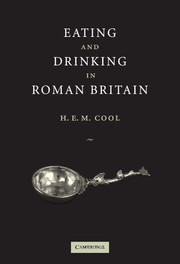Book contents
- Frontmatter
- Contents
- List of figures
- List of tables
- Preface
- Acknowledgements
- Chapter 1 Apéritif
- Chapter 2 The food itself
- Chapter 3 The packaging
- Chapter 4 The human remains
- Chapter 5 Written evidence
- Chapter 6 Kitchen and dining basics: techniques and utensils
- Chapter 7 The store cupboard
- Chapter 8 Staples
- Chapter 9 Meat
- Chapter 10 Dairy products
- Chapter 11 Poultry and eggs
- Chapter 12 Fish and shellfish
- Chapter 13 Game
- Chapter 14 Greengrocery
- Chapter 15 Drink
- Chapter 16 The end of independence
- Chapter 17 A brand-new province
- Chapter 18 Coming of age
- Chapter 19 A different world
- Chapter 20 Digestif
- Appendix: Data sources for tables
- References
- Index
Chapter 7 - The store cupboard
Published online by Cambridge University Press: 22 September 2009
- Frontmatter
- Contents
- List of figures
- List of tables
- Preface
- Acknowledgements
- Chapter 1 Apéritif
- Chapter 2 The food itself
- Chapter 3 The packaging
- Chapter 4 The human remains
- Chapter 5 Written evidence
- Chapter 6 Kitchen and dining basics: techniques and utensils
- Chapter 7 The store cupboard
- Chapter 8 Staples
- Chapter 9 Meat
- Chapter 10 Dairy products
- Chapter 11 Poultry and eggs
- Chapter 12 Fish and shellfish
- Chapter 13 Game
- Chapter 14 Greengrocery
- Chapter 15 Drink
- Chapter 16 The end of independence
- Chapter 17 A brand-new province
- Chapter 18 Coming of age
- Chapter 19 A different world
- Chapter 20 Digestif
- Appendix: Data sources for tables
- References
- Index
Summary
INTRODUCTION
In most kitchens there is a cupboard or shelf where the cook stores basic ingredients for which there is a regular need but which, for various reasons, do not have to be regularly brought in as fresh produce. Most modern British kitchens will have salt, sugar, cooking oil, and possibly a range of proprietary sauces such as tomato ketchup or brown sauce. This chapter looks at this category of food in the Romano-British kitchen.
SALT
Sodium is vital for life as without it cells become dehydrated. As sodium is continually lost through bodily functions such as sweating, it has to replaced by what we eat. People who mainly exist on a carnivorous diet can acquire the sodium they need from meat and blood. People who eat a diet with a higher proportion of plant food need to add salt (sodium chloride) to their diet.
During the late Iron Age and Roman period, salt was needed in large quantities, both as a condiment and to preserve food. It was produced by evaporation. Many salterns were to be found in areas such as the Fenland, and the coasts of Essex, Kent and the southern counties. The manufacturing process involved trapping seawater, which has a salt content of about 3%, in shallow ponds and tanks. As the water gradually evaporated by the action of the sun and wind, a brine was produced.
- Type
- Chapter
- Information
- Eating and Drinking in Roman Britain , pp. 56 - 68Publisher: Cambridge University PressPrint publication year: 2006



